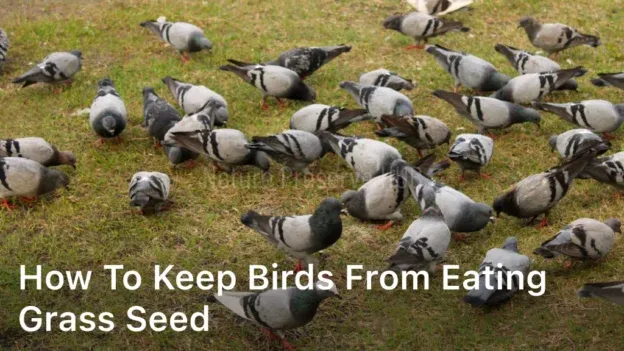Naturepreservehub.com. How to Keep Birds from Eating Grass Seed – Discover expert tips on how to keep birds from eating grass seed and maintain a lush, green lawn. Equip yourself with effective strategies today. Are you tired of birds eating your newly planted grass seed? It’s a common problem that can be frustrating for homeowners. Fortunately, there are several solutions available to prevent birds from feasting on your lawn. In this section, we will discuss effective strategies to keep birds away from your grass seed, including bird deterrents and proper lawn care. Key Takeaways: Preventing birds from eating grass seed requires a combination of strategies. Bird deterrents such as physical barriers, sound and visual repellents can be effective. Selecting bird-resistant grass seed varieties and timing planting can also help minimize bird activity. Maintaining a healthy lawn is key to making it less attractive to birds. If all else fails, commercial bird deterrent products can provide additional protection. Understanding Why Birds Eat Grass Seed Have you ever wondered why birds are so attracted to your grass seed? It turns out that bird feeding habits have a lot to do with it. Birds have a natural instinct to forage for food, and grass seed presents an easy and convenient source of nutrition for them. Moreover, bird behavior towards grass seed is rooted in their biology. Birds have a gizzard, a special organ that helps them digest food. To grind tough food items like seeds, birds swallow small stones, which then help to break down the food in the gizzard. Because grass seed is small and easy to swallow, birds tend to seek it out as a reliable source of nourishment. Additionally, the time of year influences how often birds feed on grass seed. During the spring and summer, many bird species are nesting and raising their young, which requires them to consume more protein-rich diets. Grass seed provides an excellent source of protein, making it an even more appealing food source for birds during these seasons. Choosing the Right Grass Seed Varieties Choosing the right type of grass seed can play a significant role in preventing birds from feeding on your lawn. Several bird-resistant grass seed varieties are available in the market, which are less palatable to birds. Such seeds have a bitter taste that repels birds and keeps them from feeding on your lawn. When selecting grass seed, ensure that it is labeled as bird-resistant or bird-proof. You can find such seeds in most seed catalogs or garden stores. It is also recommended to select grass seed that is better adapted to your region and climate, as it will be more resilient to pests and bird feeding. If you are unsure which type of grass seed to choose, consult a local gardening expert or contact your county’s agriculture extension office. They can provide you with valuable guidance on the best grass seed varieties for your area. Timing the Grass Seed Planting Timing the planting of your grass seed is an essential aspect of preventing birds from eating it. The timing of grass seed planting can significantly impact bird feeding activity. One crucial factor to consider is bird migration patterns. Birds migrate in search of food and shelter, and their activity levels vary based on the season. Spring and fall are the peak seasons for bird migration, so avoid planting your grass seed during these times. Planting your grass seed during the winter months, when bird activity is at its lowest, can be an effective strategy to prevent birds from feeding on it. Additionally, planting your grass seed in the early morning or late evening, when birds are less active, can also deter them from feeding on it. Another way to time your grass seed planting is to observe bird behavior in your area. If you notice that birds are frequently feeding on grass seed during a particular time of day or season, avoid planting it during those periods. Using Physical Barriers Physical barriers can be an effective solution to keep birds away from your grass seed. The following are some popular methods: Bird netting for grass seed Bird netting is a fine mesh material that can be draped over your lawn to prevent birds from accessing your grass seed. A bird netting system is easy to install and remove, making it convenient for lawn care. It’s also a cost-effective solution. Scare tactics for birds Scare tactics can be effective in deterring birds. For example, hanging reflective objects, such as CDs or old DVDs, or aluminum foil strips can disorient and scare birds away. Additionally, you can set up realistic decoys of predators, such as owls or hawks, to intimidate birds. Physical barriers to deter birds Fences, barriers, and other structures can be used to create physical obstacles that birds cannot overcome. For example, placing chicken wire over the seed or covering it with burlap can discourage birds from landing and feeding on your lawn. Bird repellent methods There are several bird repellent methods available, ranging from sprays to gels and even taste deterrents. Some bird repellents contain natural substances that birds find unappealing, like peppermint oil, while others contain chemicals that irritate birds’ senses. However, be aware that some bird repellent methods may require repeated application and can harm birds if not used properly. Implementing Sound Deterrents If you’re looking for a non-invasive method to keep birds away from your grass seed, sound deterrents can be a practical solution. These devices emit sounds that are unappealing to birds, making them fly away from your lawn. Ultrasonic devices: Ultrasonic devices are popular bird deterrents that emit high-frequency sound waves. These sounds are above the human hearing range but are audible to birds, making them feel uncomfortable and disorientated. These devices are effective in deterring a wide range of bird species. However, they have limited coverage, are sensitive to surroundings, and may not work in all situations. Audio bird repellents: Audio bird repellents produce distress calls and predator sounds that signal danger to birds. These sounds replicate the cries of birds in distress or the calls of bird





